Overview
This article offers valuable insights into the VA rating process for gastroesophageal reflux disease (GERD) claims, specifically tailored for veterans. We understand that navigating this complex system can be overwhelming, and we're here to help you through it. With the introduction of new rating criteria, it’s essential to grasp the process for obtaining benefits.
Proper documentation is crucial in this journey. Knowing the eligibility requirements can make a significant difference, and we want to ensure you avoid common pitfalls that many face. This guidance aims to empower you, providing the support you need to effectively navigate the claims process.
You are not alone in this journey, and with the right information, you can take confident steps toward securing the benefits you deserve. Remember, understanding your rights and the necessary steps is vital to your success.
Introduction
Navigating the complexities of VA benefits can feel overwhelming, especially for veterans dealing with gastroesophageal reflux disease (GERD). This condition not only impacts physical health but also significantly affects quality of life. In this article, we explore nine key insights designed to empower veterans in managing their GERD claims. We will highlight the latest updates in VA rating criteria and outline essential steps to help secure the support you deserve.
As the landscape of VA benefits continues to evolve, it’s common to wonder how you can be adequately prepared to face the challenges of the claims process. You are not alone in this journey. Together, we can tackle these obstacles and avoid common pitfalls, ensuring you receive the assistance you need.
Turnout: Streamlining VA Benefits for GERD Claims
We understand that navigating benefits can be challenging for former service members, particularly when it comes to issues like GERD. Turnout is here to help transform that experience. By utilizing AI technology, we streamline the request system, ensuring that you can access the assistance you need without the typical bureaucratic obstacles.
This innovative approach not only accelerates the process but also significantly improves your overall experience with the GERD rating VA as you navigate your claims for GERD-related benefits. You are not alone in this journey; we are committed to making it easier for you to receive the support you deserve.
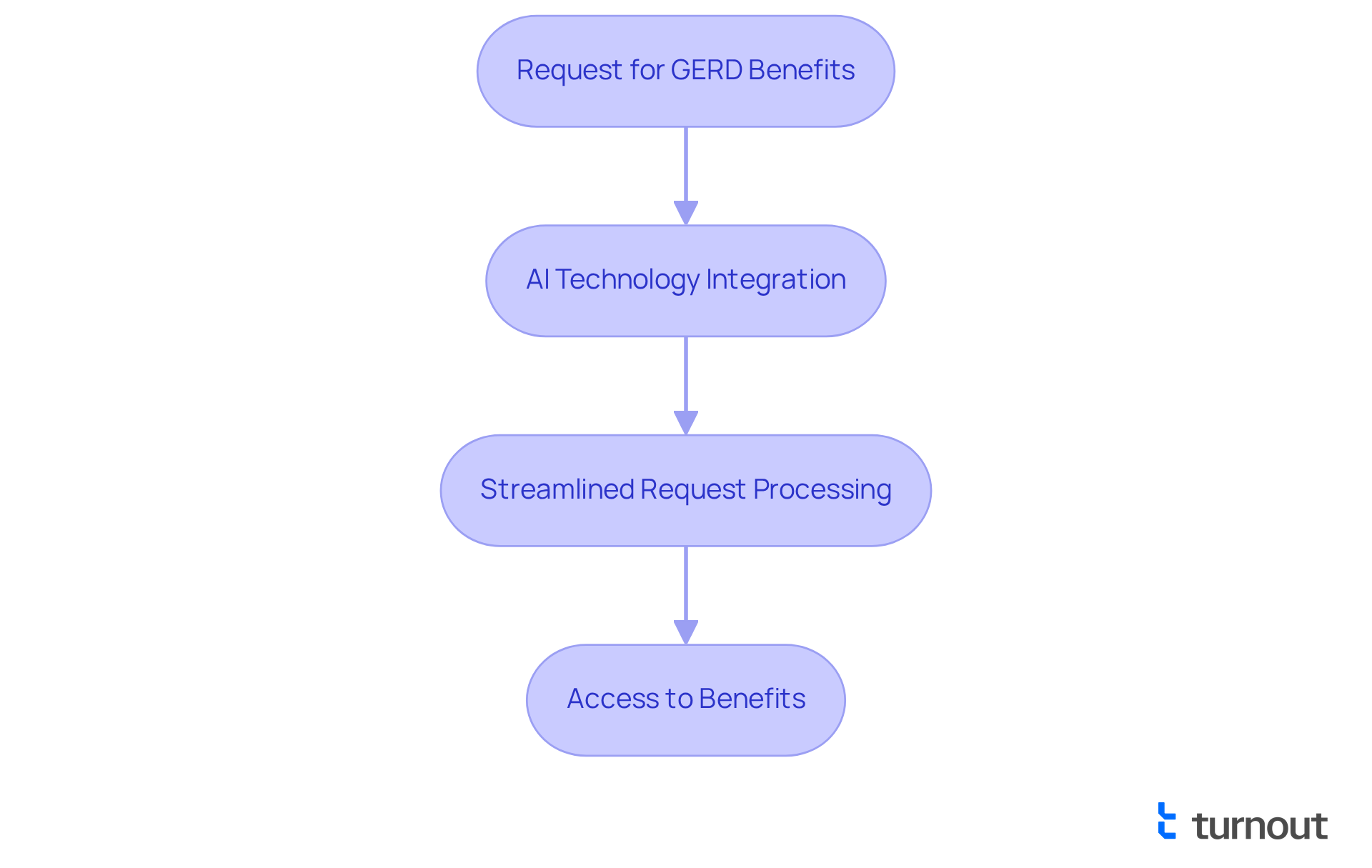
What is GERD and Its Impact on Veterans
Gastroesophageal reflux disease (GERD) is a chronic digestive disorder that can significantly affect your daily life. It occurs when stomach acid frequently flows back into the esophagus, leading to uncomfortable symptoms like heartburn, regurgitation, and trouble swallowing. For former service members, GERD can deeply influence their ability to work, rest, and maintain a healthy lifestyle.
We understand that living with GERD can be challenging. It's common to feel frustrated or overwhelmed by how it impacts your everyday activities. Recognizing the implications of GERD rating VA is essential, especially for veterans who are seeking compensation and support from the VA. You're not alone in this journey, and there are resources available to help you navigate these challenges.
By understanding GERD and its effects, you can take proactive steps toward managing your health. We're here to help you find the support you need, ensuring that you can live your life to the fullest despite the challenges of this condition.
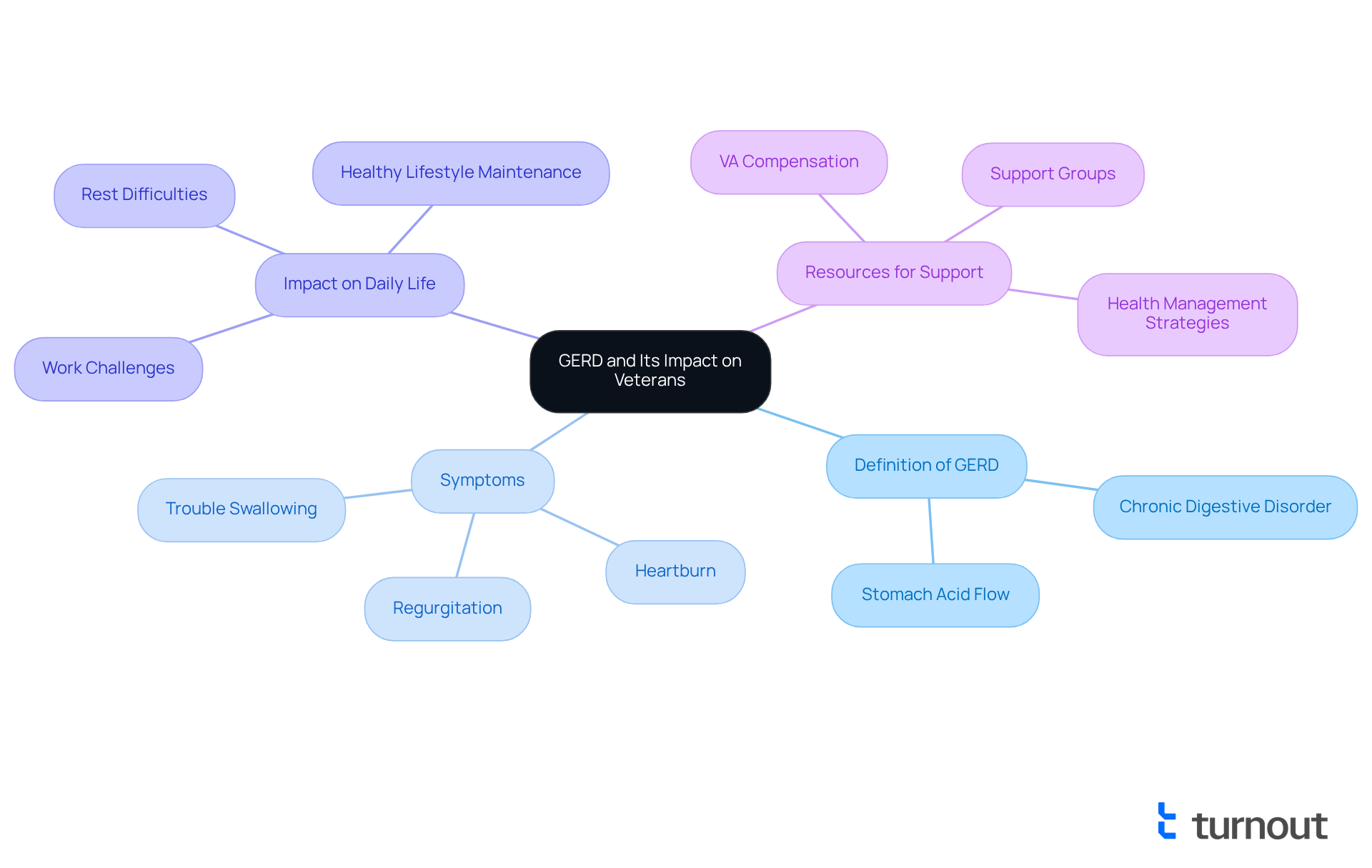
Overview of the New 2024 VA Rating Criteria for GERD
As we step into 2024, we want to share some important updates regarding the VA's new gerd rating va criteria under Diagnostic Code 7206. Understanding these changes can feel overwhelming, but we're here to help you navigate this journey. Gerd rating va now ranges from 0% to 80%, depending on the severity of your symptoms and how they impact your daily life.
Key factors to consider include:
- How often you experience symptoms
- Whether you need medication
- Any structural damage to your esophagus
It’s common to feel uncertain about your eligibility for benefits, but grasping these criteria is crucial for former service members like you. Remember, you are not alone in this process, and understanding these details can empower you to take the next steps toward receiving the support you deserve.
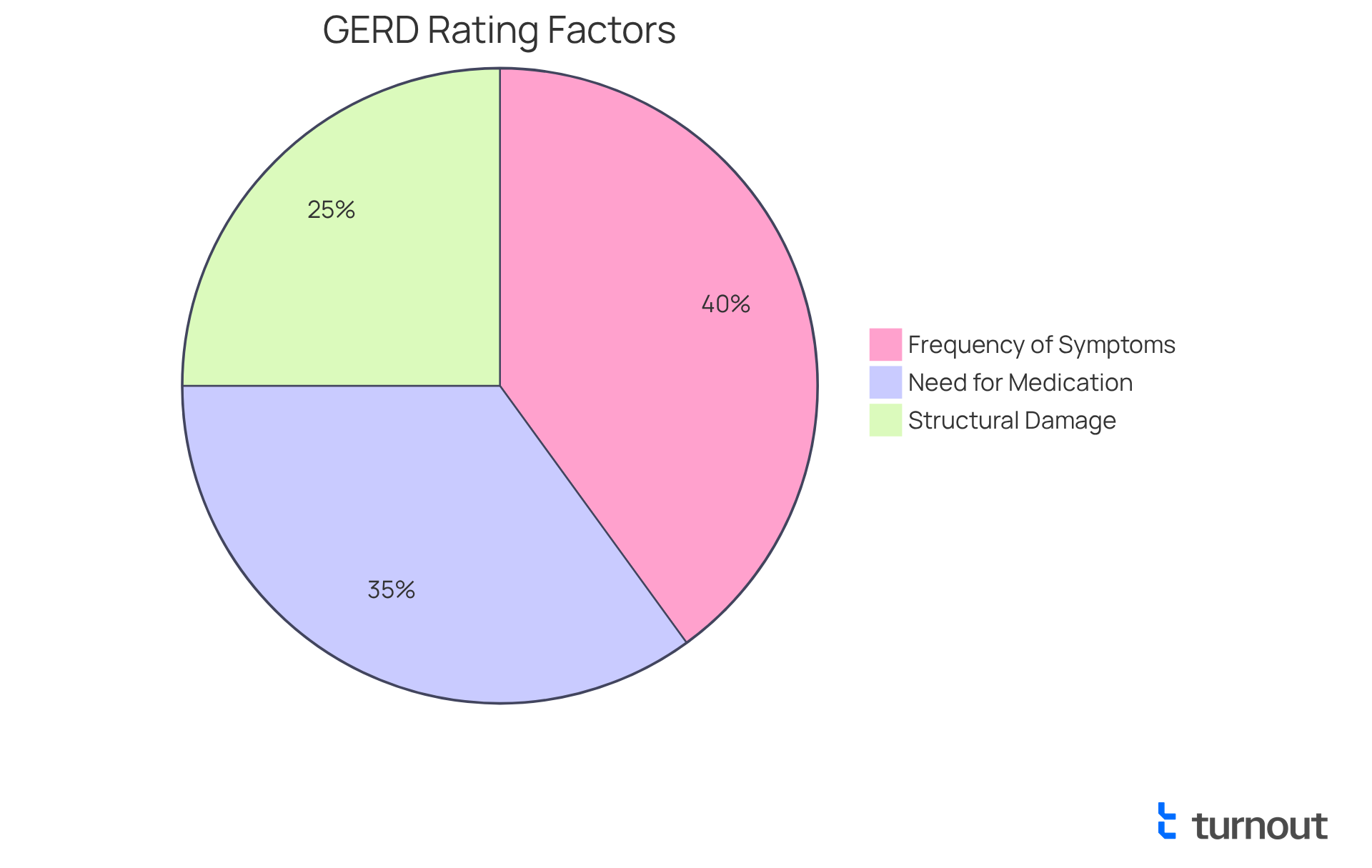
Proving Service Connection for GERD in VA Claims
Navigating the process of obtaining VA benefits for GERD rating can feel overwhelming for former service members. We understand that establishing a service connection requires compelling medical evidence linking your condition to military service. This means obtaining a formal diagnosis from a healthcare provider and documenting the symptoms you've experienced during or after your service.
A nexus letter from a doctor can significantly strengthen your case. This letter clearly outlines how your military service may have contributed to the onset of gastroesophageal reflux disease (GERD), which can help expedite the claims process. It's common to feel challenged in this journey; as one veteran shared, 'Connecting my acid reflux to my service was a challenge, but with the appropriate medical evidence, I was able to present my case.'
Typical medical evidence for GERD cases includes:
- Medical records
- Symptom journals
- Statements from healthcare providers that describe how this condition impacts your daily life
Additionally, you may need to demonstrate how your acid reflux symptoms have been exacerbated by service-related factors, such as stress or medications.
It's also important to note that GERD can be considered a secondary condition linked to other service-connected disabilities, which may further strengthen your claim. By carefully gathering and presenting this evidence, you can significantly improve your chances of a successful claim for GERD rating benefits.
If you find yourself needing assistance, remember that organizations like Turnout are here to help. Supporting over 2 million veterans, they provide valuable guidance in navigating the VA benefits process. You are not alone in this journey, and reaching out for help can make a difference.
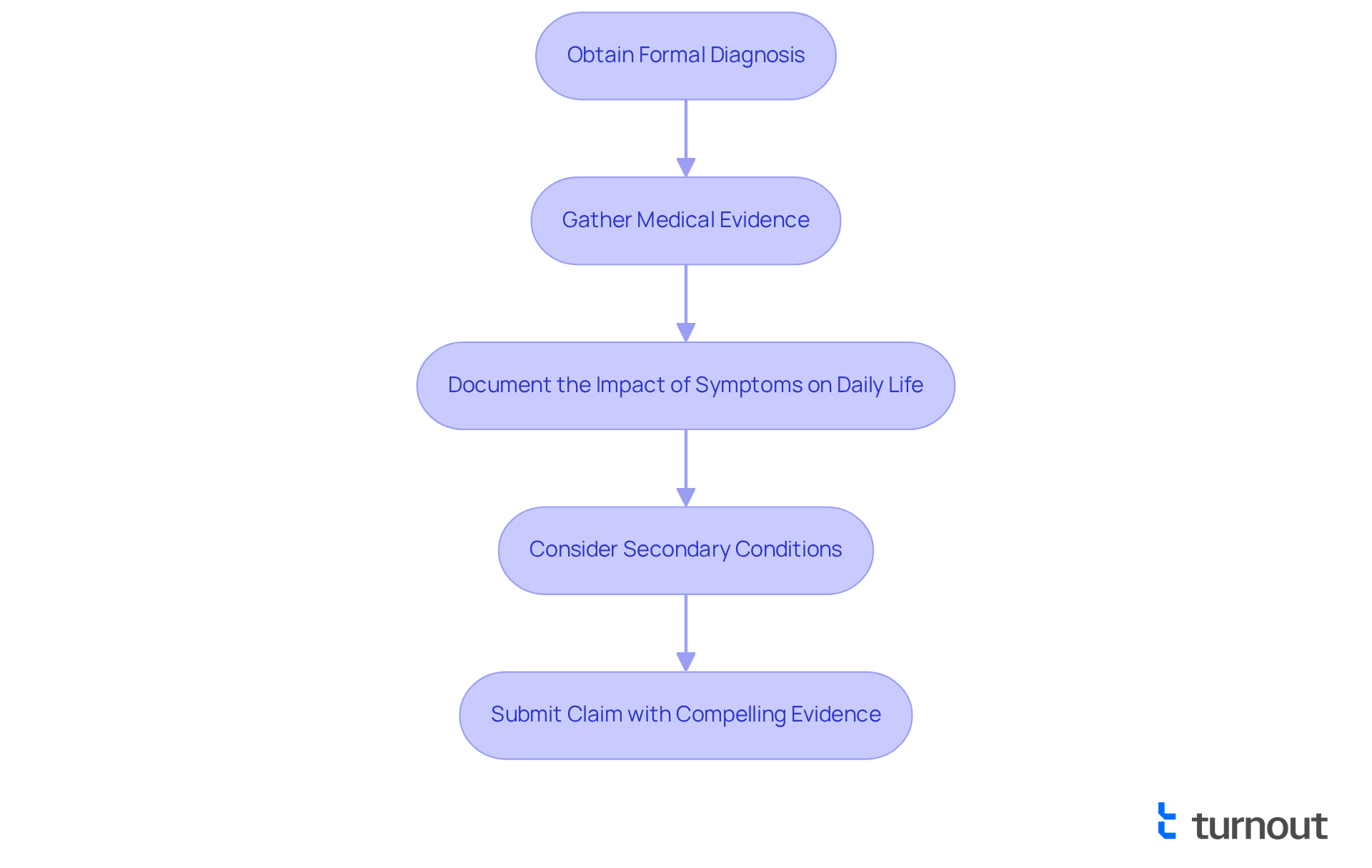
Eligibility Requirements for VA Benefits Related to GERD
For veterans seeking benefits for gastroesophageal reflux disease, understanding the gerd rating va eligibility requirements is important. You need to have:
- A current diagnosis of gastroesophageal reflux disease
- A gerd rating va
- Evidence of service connection
- Documentation of symptom severity
We recognize that this process can feel overwhelming.
Additionally, former military personnel must have served in a capacity that could plausibly lead to gastroesophageal reflux disease. This may include exposure to certain environmental elements or stressors during their service. Remember, you are not alone in this journey, and we’re here to help you navigate these requirements with care and compassion.
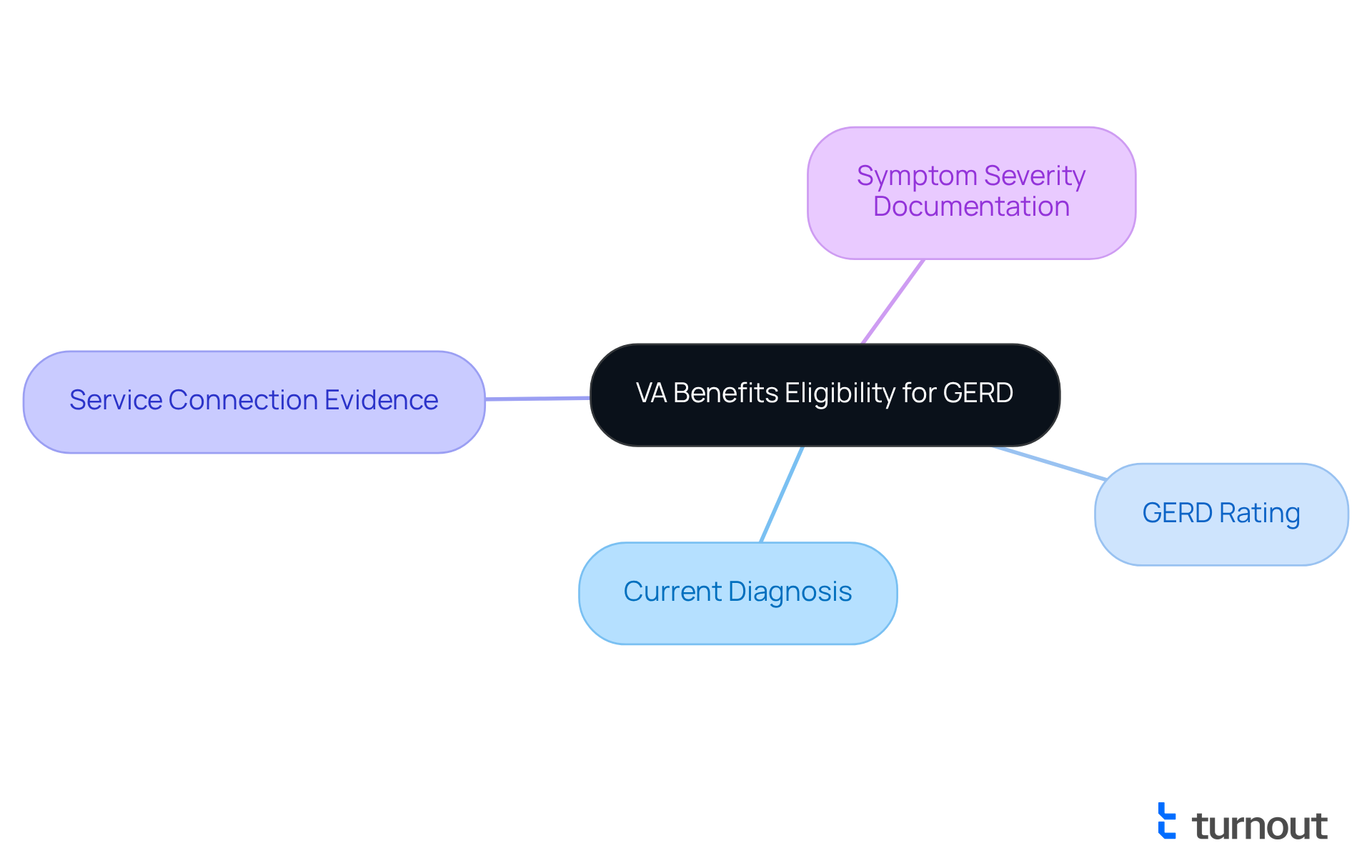
Essential Documentation for GERD VA Claims
Filing a VA claim for GERD rating VA can feel overwhelming, but you are not alone in this journey. To help you through this process, it’s essential to gather the right documentation. Here are the key items you should consider:
- Medical records detailing your diagnosis and treatment of GERD.
- A nexus letter from a healthcare provider linking your condition to military service.
- Evidence of symptom severity, such as your treatment history and medication usage.
- Any pertinent service records that may bolster your request.
Proper documentation is crucial for achieving a successful GERD rating VA. We understand that this process can be challenging, and we’re here to help you every step of the way.
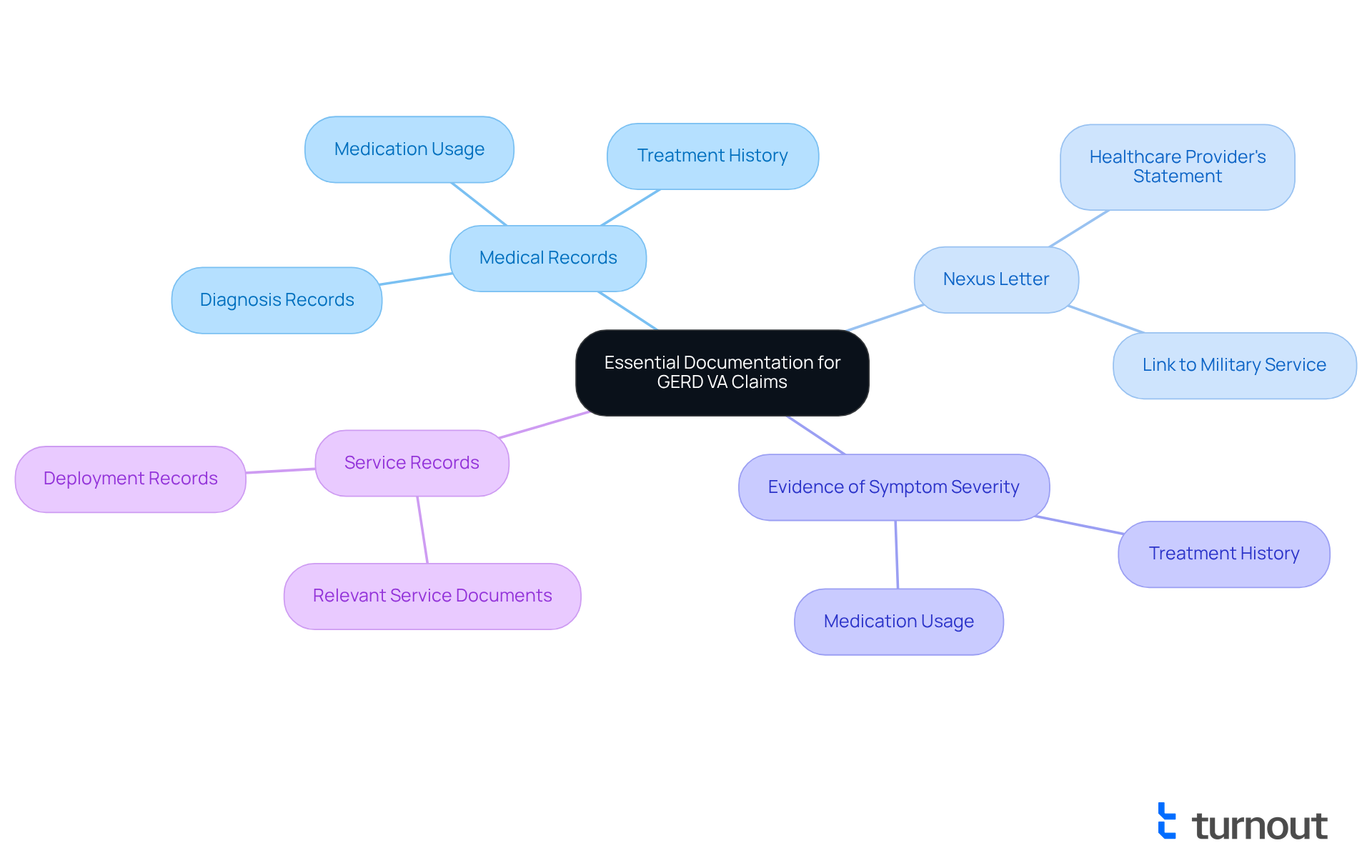
Steps to File a VA Claim for GERD
Filing a VA claim for a GERD rating can feel overwhelming, but we're here to help you navigate this process with compassion and understanding. Here are the key steps to guide you:
-
Gather Documentation: Start by collecting all necessary medical records, nexus letters, and service records. This is an important first step in supporting your claim.
-
Complete the Application: Next, fill out VA Form 21-526EZ, which is the application for disability compensation. Take your time to ensure all information is accurate.
-
Submit the Request: You can file your request online through the VA website or by mail. Choose the method that feels most comfortable for you.
-
Attend the C&P Exam: Be prepared for a Compensation and Pension (C&P) exam. During this appointment, a VA examiner will assess your condition. It's common to feel anxious, but remember that this is a standard part of the process.
-
Follow Up: Lastly, keep track of your claim status and respond promptly to any requests for additional information from the VA. Staying engaged can help ensure your claim is processed smoothly.
We understand that this journey can be challenging, but with the support of GERD rating VA, you are not alone. Each step you take brings you closer to the support you need.
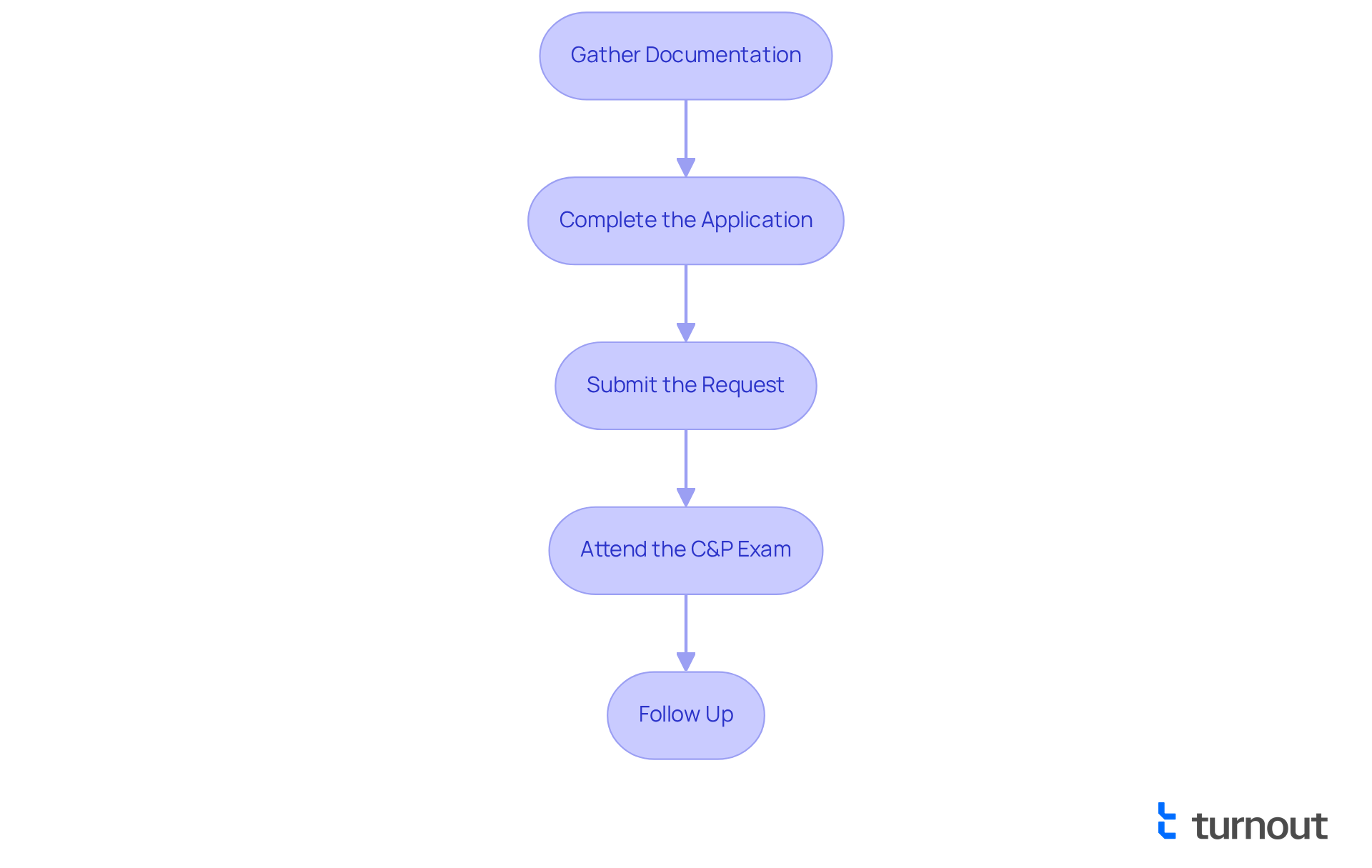
Common Mistakes Veterans Make When Filing GERD Claims
Veterans often encounter several pitfalls when filing claims related to GERD rating VA, which can significantly impact their chances of approval. We understand that navigating this process can be overwhelming, and it’s important to be aware of common mistakes that can hinder success.
- Insufficient Documentation: Many veterans may not submit adequate medical evidence or nexus letters that establish a connection between their GERD and military service. This absence of documentation can lead to denials or delays in requests, which can be frustrating.
- Missing Deadlines: Adhering to filing deadlines is crucial. If veterans miss these deadlines, they risk jeopardizing their claims, as the VA may not consider late submissions. On average, it takes 151.2 days to receive a decision on the GERD rating VA from the VA. Timely submissions are essential to avoid unnecessary delays.
- Inaccurate Information: Providing incorrect or incomplete information on the application form can complicate the process. It’s vital for former service members to ensure that all details are precise and thorough to prevent further delays.
- Neglecting Follow-Up: After submitting a request, individuals must actively check its status and respond promptly to any inquiries from the VA. Failing to do so can lead to prolonged processing times and missed opportunities for resolution. Remember, former service members have up to one year to request a Board Appeal ruling if their application is denied. This highlights the significance of precision and follow-up in the application system.
By being aware of these common mistakes and taking proactive measures to prevent them, you can improve your odds of successfully navigating the GERD rating VA claims process for gastrointestinal reflux disease. We are here to help you through this journey. Turnout's emphasis on benefits for former service members underscores the systemic issues they encounter, highlighting the importance of effective advocacy in addressing these challenges. You are not alone in this process, and together, we can work towards a better outcome.
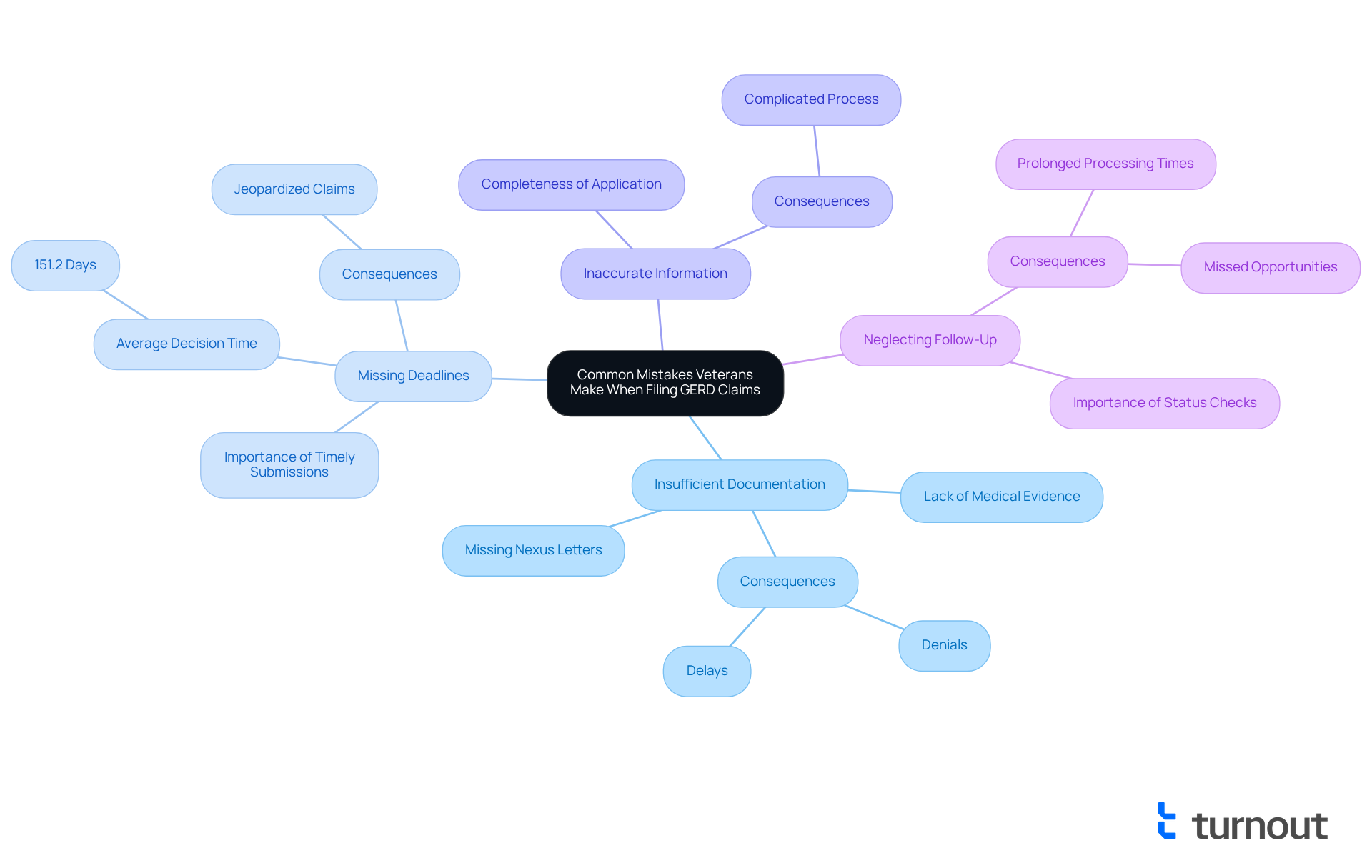
GERD as a Secondary Condition: What Veterans Need to Know
Gastroesophageal reflux disease (GERD) can sometimes be a secondary condition, especially when it arises from another service-connected disability. We understand that individuals coping with PTSD or anxiety may find that stress or medications for their treatment can lead to uncomfortable symptoms like acid reflux.
To effectively assert that GERD is a secondary condition, it's essential for former military personnel to provide medical evidence linking their primary condition to the GERD rating VA associated with the onset of this disease. This includes obtaining a nexus letter from a healthcare provider, which can be a vital step in your journey toward understanding and managing your health.
Remember, you are not alone in this experience. We’re here to help guide you through the process, ensuring you have the support you need to navigate these challenges.
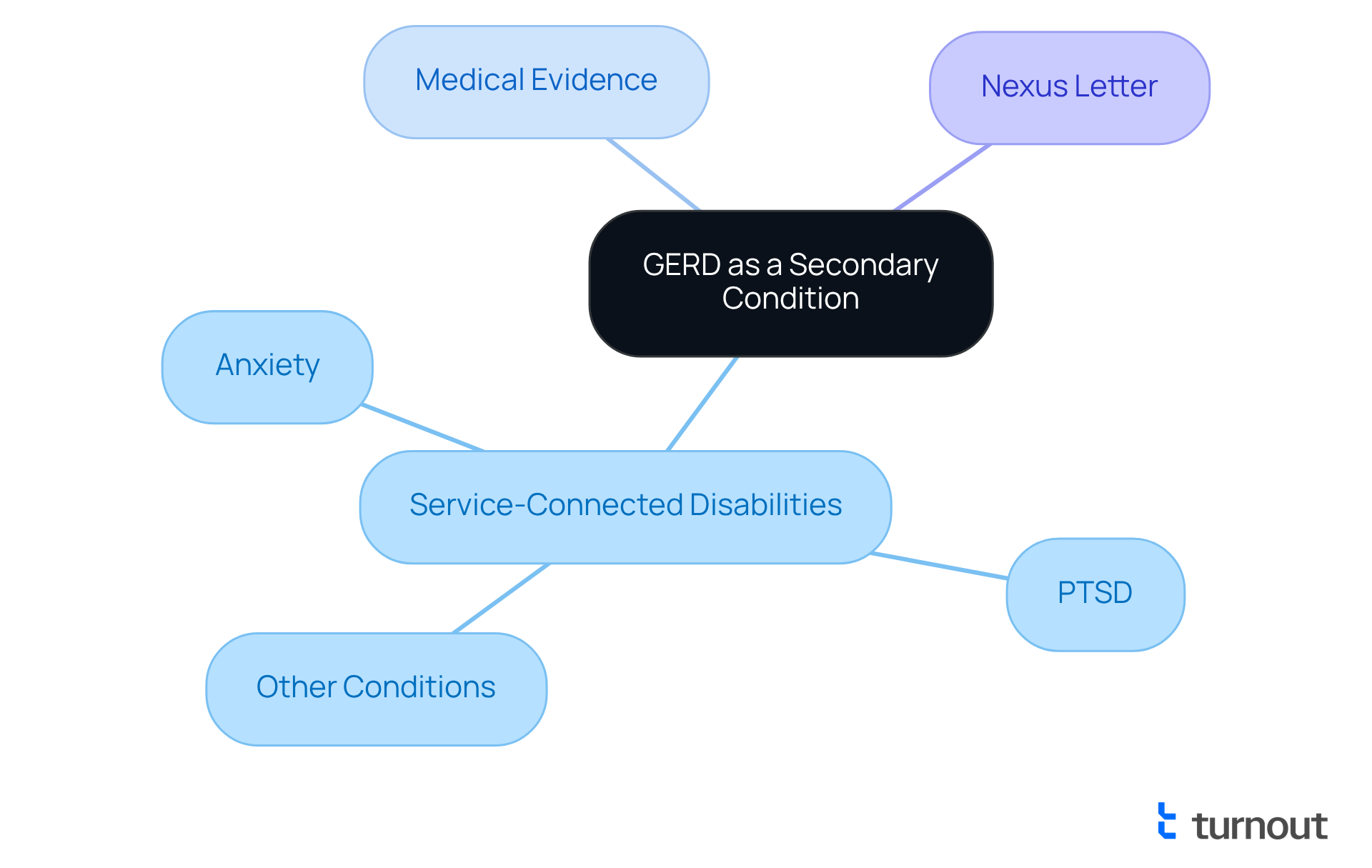
Navigating the Appeals Process for GERD VA Claims
If a VA request for a GERD rating va is denied, it’s important to know that you have the right to contest that decision. We understand that this can be a frustrating experience, but the appeals process offers several key steps to help you navigate this journey.
- Review the Decision: Take a moment to understand the reasons for denial by carefully examining the denial letter. This is your first step in addressing the issue.
- Gather Additional Evidence: Collect new medical evidence or documentation that supports your claim. This may include updated medical records or expert opinions that can strengthen your case.
- File a Notice of Disagreement (NOD): Don’t hesitate to submit an NOD to the VA within one year of the denial. This formalizes your intent to contest the decision.
- Attend a Hearing: If necessary, attend a hearing to present your case and provide additional context. Your voice matters in this process.
- Await the Decision: After your appeal is submitted, the VA will review it and issue a new decision. If you face another denial, remember that further appeals can be made to the Board of Veterans' Appeals.
Many veterans have successfully navigated this journey, often sharing their experiences of overcoming initial denials. For instance, gathering comprehensive medical evidence has significantly improved their chances of a favorable outcome. In fact, Legacy Appeals boast a 36% approval rate, highlighting the importance of thorough documentation and persistence in the appeals procedure.
It’s common to feel overwhelmed during this process, as the typical duration for VA appeals can vary. It often requires several months to more than a year, depending on the complexity of your case and the number of appeals being handled.
Community support is invaluable on this journey. Former service members can find encouragement and resources from others who have faced similar challenges. Platforms like Turnout’s advocacy can assist veterans in navigating this process, providing the necessary tools and support to help secure the benefits you deserve. Remember, you are not alone in this journey—we're here to help.
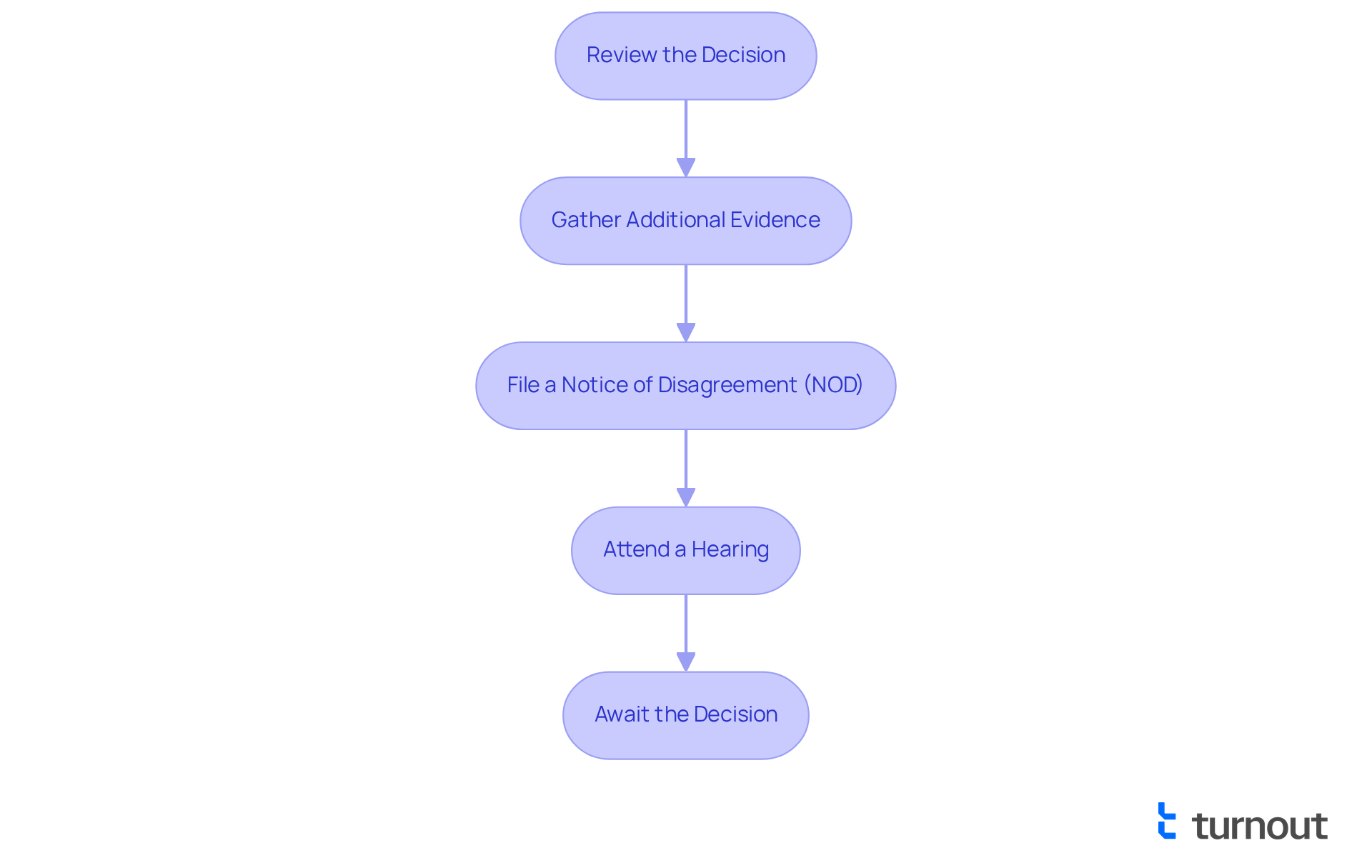
Conclusion
Navigating the complexities of GERD rating VA benefits can feel overwhelming for veterans seeking the support they deserve. We understand that understanding the implications of gastroesophageal reflux disease and how it affects daily life is the first step in addressing the challenges associated with obtaining VA benefits. By leveraging resources and support systems, veterans can better manage their health and advocate for their rights.
Throughout this article, we shared key insights regarding the updated 2024 VA rating criteria, essential documentation needed for filing claims, and common mistakes to avoid during the process. It’s crucial to establish a service connection through comprehensive medical evidence, and it’s important to recognize that GERD may be acknowledged as a secondary condition linked to other service-related disabilities. Additionally, we outlined the steps to successfully file a claim and navigate the appeals process, providing a roadmap for veterans to follow.
Ultimately, the journey to secure GERD-related benefits is not one that you must undertake alone. Resources like Turnout are available to guide you through the intricacies of the VA claims process. By staying informed, gathering the right documentation, and seeking assistance when needed, you can enhance your chances of receiving the benefits you are entitled to. Taking proactive steps today can lead to a healthier and more supported tomorrow for those who have served. Remember, you are not alone in this journey; we’re here to help.
Frequently Asked Questions
What is GERD and how does it affect veterans?
Gastroesophageal reflux disease (GERD) is a chronic digestive disorder that causes stomach acid to frequently flow back into the esophagus, leading to symptoms like heartburn, regurgitation, and trouble swallowing. For veterans, GERD can significantly impact their daily life, affecting their ability to work, rest, and maintain a healthy lifestyle.
How can Turnout assist veterans with GERD claims?
Turnout utilizes AI technology to streamline the request system for VA benefits related to GERD, making it easier for veterans to access the assistance they need without facing typical bureaucratic obstacles. This innovative approach accelerates the claims process and improves the overall experience for veterans seeking support.
What are the new VA rating criteria for GERD in 2024?
The new VA rating criteria for GERD in 2024 range from 0% to 80%, depending on the severity of symptoms and their impact on daily life. Key factors influencing the rating include the frequency of symptoms, the need for medication, and any structural damage to the esophagus.
How can understanding GERD rating help veterans?
Understanding the GERD rating criteria is crucial for veterans seeking compensation and support from the VA. It empowers them to assess their eligibility for benefits and take proactive steps toward receiving the help they deserve.
Are there resources available for veterans dealing with GERD?
Yes, there are resources available to help veterans navigate the challenges of living with GERD. Organizations like Turnout are dedicated to providing support and information to help veterans manage their health and access the benefits they need.




